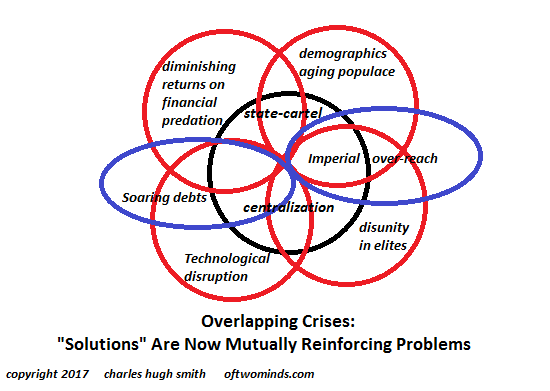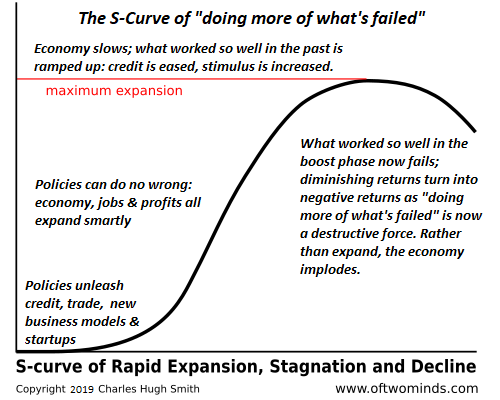2024, A Year of No Significance
September 17, 2024
Click here to listen to an AI generated podcast on this essay.
Looking back, 2024 may well be viewed as insignificant compared to what lies ahead.
That 2024 could be a year of no significance does not compute given that what's being touted as the most important election in American history is 2024's landmark event, but in the focus of the longer lens of history, it may not matter as much as we expect.
If the election wasn't enough, the all-time stock market highs are the cherries on top.
The issue here isn't the people or the politics or the policies; it's the system itself reaching its limits, having exhausted all potential for the scale of change needed to stave off collapse. To better understand this historical context, we turn to Ray Huang's meticulous study of Chinese history, 1587, A Year of No Significance: The Ming Dynasty in Decline:
"The year 1587 may seem to be insignificant; nevertheless, it is evident by that time the limit for the Ming dynasty had already been reached. It no longer mattered whether the ruler was conscientious or irresponsible, whether his chief counselor was enterprising or conformist, whether the generals were resourceful or incompetent, whether the civil officials were honest or corrupt, or whether the leading thinkers were radicals or conservatives--in the end they all failed to reach fulfillment."
In other words, it no longer matters who's nominally in charge, or the policies being put in place: the system has lost the capacity to adapt radically enough to surmount the novel challenges it now faces. That the Ming Dynasty--and many other imperial regimes throughout history--faced the same limits is unsurprising when we recall that humanity is still running Wetware 1.0, the operating system that enabled our emergence as a unique species around 200,000 years ago. We are hard-wired to reach a point of hubristic, delusional faith in our own godlike powers which invites Nemesis. We're there, but we don't yet realize it.
There are several key dynamics at work in this systemic exhaustion of the capacity to adapt radically enough to matter. One is self-interest: everyone getting a slice of the pie--from those receiving SNAP food stamps to billionaires evading taxes--has a stake in maintaining the status quo, and so nobody wants to risk upsetting the apple cart for fear that the change might reduce or eliminate their slice of the pie.
The net result is everyone will resist any reform radical enough to actually address the overlapping crises which threaten the status quo, which is every radical reform.

Here is Huang's summary of this same dynamic in 1587: "The bureaucratic rule of the empire had reached such an advanced stage that all the hidden needs and wants of thousands of individuals, along with their personal aspirations, were irreversibly linked to the gigantic status quo; now even an urgently needed technical reform could not be overtly attempted to disturb the delicate balance."
This delicate balance is currently maintained by borrowing as many trillions of dollars as needed to satisfy every constituency, from SNAP recipients to billionaires. That this is unsustainable is taboo, of course, but beneath the surface, the impossibility of maintaining this delicate balance is the core driver of the extreme political polarization that makes radical reform impossible: given that the delicate balance is unsustainable, the challenge now is to settle who wins and who loses, a battle that evaporates any middle ground and amplifies polarization.
This is the heart of Huang's study of Ming decline: the systems in place are limited by their structure such that any reform that will be acceptable to the system's dependents will leave the system--that requires radical reform to avoid collapse--completely untouched. "Innovations" and "reforms" can only be superficial and for show.
Given the limits of the system's structures and its destabilizing, unsustainable excesses, the entire system has only one option: decline to the point that a seemingly modest crisis disrupts the last shreds of coherence and the resulting nonlinear dynamics collapse the system.
That the status quo has reached the greased slide down the backside of the S-Curve is also taboo.

This quote from Michael Grant's succinct book The Fall of the Roman Empire strikes me as the keystone insight into western Rome's collapse: the elite's complacent belief in Rome's eternal success and their inability to recognize the novel challenges they faced.
"There was no room at all, in these ways of thinking, for the novel, apocalyptic situation which had now arisen, a situation which needed solutions as radical as itself. His whole attitude is a complacent acceptance of things as they are, without a single new idea.
This acceptance was accompanied by greatly excessive optimism about the present and future. Even when the end was only sixty years away, and the Empire was already crumbling fast, Rutilius continued to address the spirit of Rome with the same supreme assurance.
This blind adherence to the ideas of the past ranks high among the principal causes of the downfall of Rome. If you were sufficiently lulled by these traditional fictions, there was no call to take any practical first-aid measures at all."
Everyone getting a slice of pie is confident that the current crises are no different than the spots of bother that were mere bumps in the road of the past 70 years. That "this time is different" does not compute because nobody is willing to face the reality that radical reforms are the only way forward, but such reforms will demand enormous sacrifices and impose innately high risks on every participant.
Rather than face that unsavory option, we await our seating at a fantasy banquet where AI fixes all problems and we get to continue gorging ourselves at the table of plenty. That the real-world banquet of consequences is about to served is taboo.
Looking back, 2024 may well be viewed as insignificant compared to what lies ahead.
New podcast:
Is the Everything Bubble About to Pop? (37 min, 40 charts)
My recent books:
Disclosure: As an Amazon Associate I earn from qualifying purchases originated via links to Amazon products on this site.
Self-Reliance in the 21st Century print $18, (Kindle $8.95, audiobook $13.08 (96 pages, 2022) Read the first chapter for free (PDF)
The Asian Heroine Who Seduced Me (Novel) print $10.95, Kindle $6.95 Read an excerpt for free (PDF)
When You Can't Go On: Burnout, Reckoning and Renewal $18 print, $8.95 Kindle ebook; audiobook Read the first section for free (PDF)
Global Crisis, National Renewal: A (Revolutionary) Grand Strategy for the United States (Kindle $9.95, print $24, audiobook) Read Chapter One for free (PDF).
A Hacker's Teleology: Sharing the Wealth of Our Shrinking Planet (Kindle $8.95, print $20, audiobook $17.46) Read the first section for free (PDF).
Will You Be Richer or Poorer?: Profit, Power, and AI in a Traumatized World
(Kindle $5, print $10, audiobook) Read the first section for free (PDF).
The Adventures of the Consulting Philosopher: The Disappearance of Drake (Novel) $4.95 Kindle, $10.95 print); read the first chapters for free (PDF)
Money and Work Unchained $6.95 Kindle, $15 print) Read the first section for free
Become a $3/month patron of my work via patreon.com.
Subscribe to my Substack for free
NOTE: Contributions/subscriptions are acknowledged in the order received. Your name and email remain confidential and will not be given to any other individual, company or agency.
|
Thank you, Jeff H. ($7/month), for your wondrously generous subscription to this site -- I am greatly honored by your support and readership. |
Thank you, Stephen V. ($32.40), for your superbly generous patronage to this site -- I am greatly honored by your support and readership. |
|
|
Thank you, Karen A. ($54), for your most generous patronage to this site -- I am greatly honored by your support and readership. |
Thank you, Sean B. ($10/month), for your outrageously generous patronage to this site -- I am greatly honored by your support and readership. |